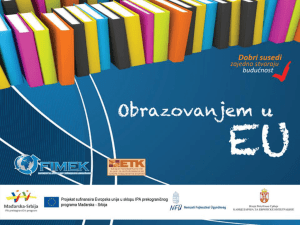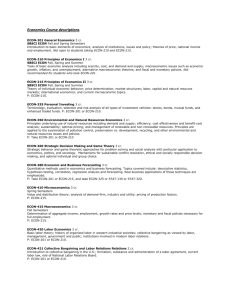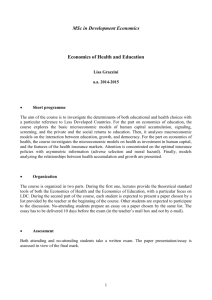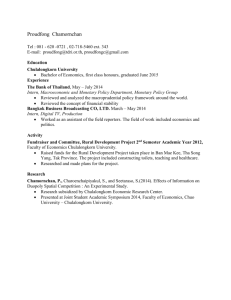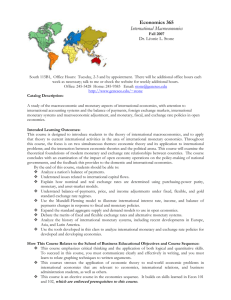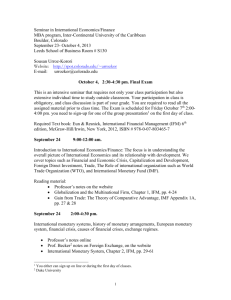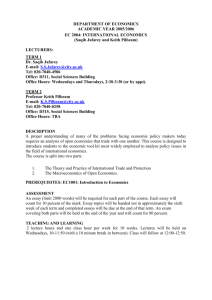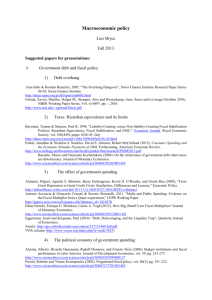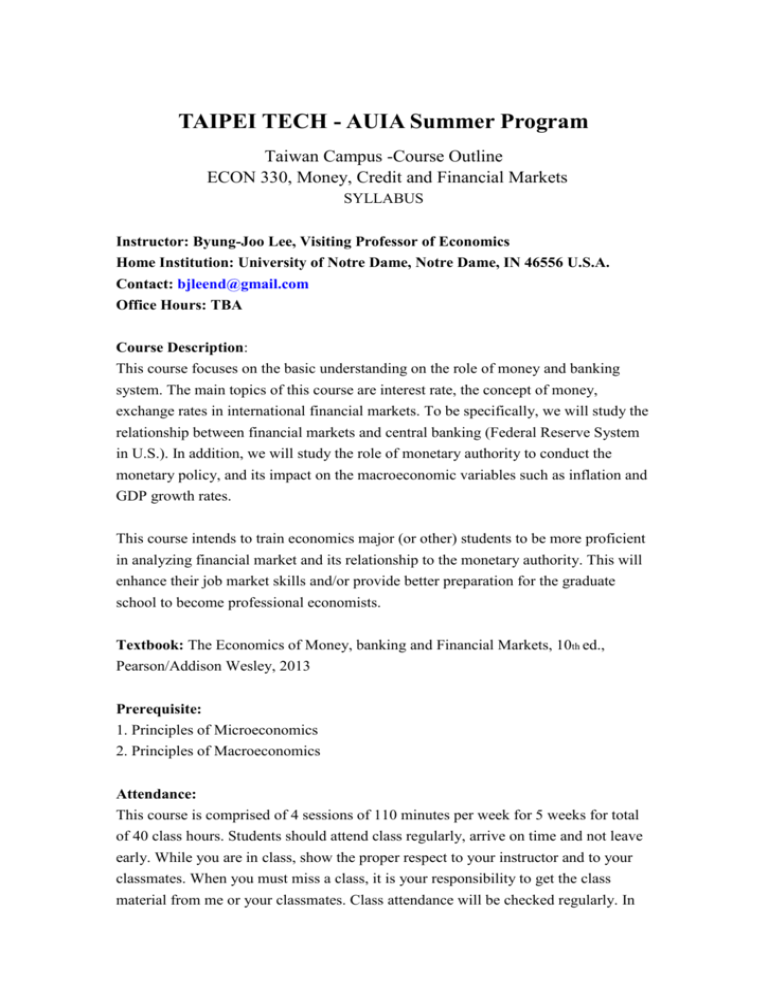
TAIPEI TECH - AUIA Summer Program
Taiwan Campus -Course Outline
ECON 330, Money, Credit and Financial Markets
SYLLABUS
Instructor: Byung-Joo Lee, Visiting Professor of Economics
Home Institution: University of Notre Dame, Notre Dame, IN 46556 U.S.A.
Contact: bjleend@gmail.com
Office Hours: TBA
Course Description:
This course focuses on the basic understanding on the role of money and banking
system. The main topics of this course are interest rate, the concept of money,
exchange rates in international financial markets. To be specifically, we will study the
relationship between financial markets and central banking (Federal Reserve System
in U.S.). In addition, we will study the role of monetary authority to conduct the
monetary policy, and its impact on the macroeconomic variables such as inflation and
GDP growth rates.
This course intends to train economics major (or other) students to be more proficient
in analyzing financial market and its relationship to the monetary authority. This will
enhance their job market skills and/or provide better preparation for the graduate
school to become professional economists.
Textbook: The Economics of Money, banking and Financial Markets, 10th ed.,
Pearson/Addison Wesley, 2013
Prerequisite:
1. Principles of Microeconomics
2. Principles of Macroeconomics
Attendance:
This course is comprised of 4 sessions of 110 minutes per week for 5 weeks for total
of 40 class hours. Students should attend class regularly, arrive on time and not leave
early. While you are in class, show the proper respect to your instructor and to your
classmates. When you must miss a class, it is your responsibility to get the class
material from me or your classmates. Class attendance will be checked regularly. In
the event of extended absence, students should report to instructor and/or academic
dean for approval. Excessive absence may result in the course grade of "F".
Grading:
There will be one midterm exam and one final exam, 30% each. Exams test basic
macroeconomic theory. Project paper accounts for 30%, and homework for the
remaining 10% for the course grade.
Group Research Project Paper: Guideline
1. The paper should be a brief presentation of relevant economic theory and other
current economic issues. The paper should be brief but as complete as possible. It
should be less than 10 pages (double spaced).
2. Your paper could be theoretical or empirical analysis of current economic issues. It
does not have to involve data analysis. East Asian or Taiwanese related monetary or
foreign exchange policy or any other macroeconomic policy issues are good choice of
topics.
3. Your paper is due before Session 18. Depending on the class size, all or some select
projects are asked (or voluntarily) to present the paper in the class. Each paper will be
given about 15-20 minutes to present your paper.
Academic Honor Code:
The Code of Honor will be strictly applied. Honor Code pledges "I will not participate
in or tolerate academic dishonesty." Students will not give or receive aid on exams.
This includes, but is not limited to, viewing the exams of others, sharing answers with
others, and using books or notes while taking the exam. You can collaborate to study
your homework, but you have to submit your own completed homework to receive
appropriate credit. Copying solutions from others, whether they are current or past,
constitutes plagiarism.
Tentative Course Schedule
The course outline is tentative and I will modify accordingly depending on the pace of
the class.
We will cover as many topics as time permits, but I will take time to make sure every
student understand class material well.
Week 1: Course overview Introduction
Session 1: Chapter 1: Why Study Money, Banking and Financial Markets?
Session 2: Chapter 2: An Overview of Financial System
Session 3: Chapter 3: What Is Money?
Session 4: Chapter 22: Aggregate Demand and Supply
Week 2: Financial Market Analysis
Session 5: Chapter 4: Understanding Interest Rates
Session 6: Chapter 5: The Behavior of Interest Rates
Session 7: Chapter 6: The Risk and Term Structure of Interest Rates
Session 8: Chapter 7: The Stock Markets and the Theory of Rational Expectations
Week 3: Central Bank and Monetary Policy
Session 9: Midterm Exam
Session 10: Chapter 13: Central Bank and the Federal Reserve System
Session 11: Chapter 14: The Money Supply Process
Session 12: Chapter 15: Tools of Monetary Policy
Week 4: Monetary Policy and International Finance
Session 13: Chapter 16: The Conduct of Monetary Policy
Session 14: Chapter 17: The Foreign Exchange Market
Session 15: Chapter 17 Appendix: The Interest Parity Condition
Session 16: Chapter 18: The International Financial System
Week 5: Monetary Theory
Session 17: Chapter 19: Quantity Theory, Inflation and the Demand for Money
Session 18: Class Project Presentation
Session 19: Class Project Presentation
Session 20: Final Exam
Professor Byung-Joo Lee earned his economics Master’s and Ph.D. degrees from the
University of Wisconsin-Madison. He also earned economics Master’s degree from
the Pennsylvania State University at State College. He earned his bachelor’s degree
from the Seoul National University, Seoul, South Korea. He is currently teaching at
the University of Notre Dame. He previously taught at the University of
Colorado-Boulder. He was the President and the President-elect of the Korea America
Economic Association (KAEA) in 2011-2012.
His teaching and research area in economics is econometric analysis and international
finance. He has written extensively on theoretical and applied econometrics subjects.
Among his contributions are Econometrica (1992), Economics Letters (1994), Journal
of Quantitative Economics (1994), and Oxford Bulletin of Economics and Statistics,
2000). Recently, his research focuses on the international finance. His recent
publications are in The Journal of Korean Economy (2003), Journal of International
Finance (2010), Pacific Economic Review (2011), Review of International Economics
(2011), and International Review of Economics and Finance (2012).

